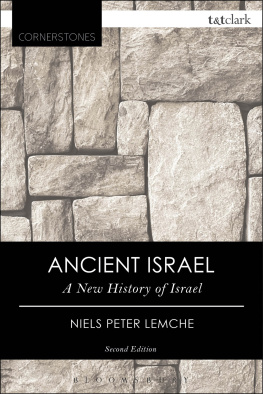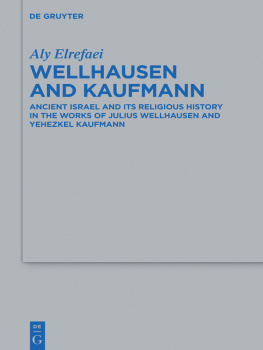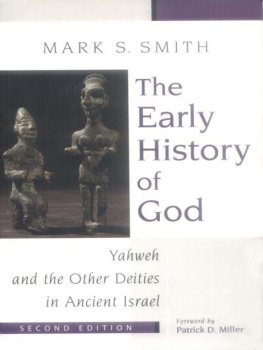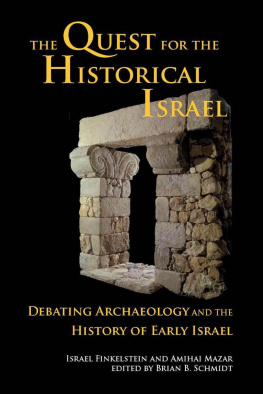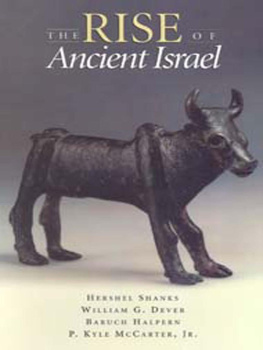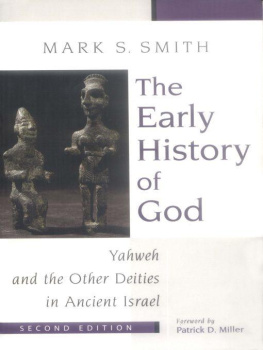Ancient Israel
Other Titles in the Cornerstones Series
The Israelite Woman by Athalya Brenner-Idan
In Search of Ancient Israel by Philip R. Davies
Fragmented Women by J. Cheryl Exum
Sanctify Them in the Truth by Stanley Hauerwas
Solidarity and Difference by David G. Horrell
One God, One Lord by Larry Hurtado
Neither Jew nor Greek by Judith Lieu
Jesus: Miriams Child, Sophias Prophet by Elisabeth Schssler-Fiorenza
The Christian Faith by Friedrich Schleiermacher
The Pentateuch: A Social and Critical Commentary by John Van Seters
The Christian Doctrine of God by Thomas F. Torrance
Paul and the Hermeneutics of Faith by Francis Watson
Word and Church by John Webster
Confessing God by John Webster
Ancient Israel
A New History of Israel
Second Edition
Niels Peter Lemche
Bloomsbury T&T Clark
An imprint of Bloomsbury Publishing Plc

Contents
In the last generation or so literally scores of histories of Israel and introductions to the study of the Old Testament or of Israelite religion have appeared. Why, then, should anyone take the trouble to either write or edit yet another addition to this prodigious list? The reason why this writer has chosen to do so is that a fundamentally new approach to the study of Israelite history and religion is more needed now than at any time in the past. Until the present, most scholars have offered in the guise of research efforts which are by no means independent scholarly interpretations of the history of Israel, but more or less rationalistic paraphrases of the biblical version of the history of Israel and its religion. This approach is becoming increasingly unsatisfactory, especially when it is considered in the light of the ongoing discussion of the earliest history of the Israelite people.
In presenting this new attempt at a synthesis I have been able to build on the results of the research which was set out in detail in my previous volume, Early Israel. Anthropological and Historical Studies on the Israelite Society Before the Monarchy (Leiden, 1985). Here I argued that it is absurd to speak of historical recollections in the Old Testament which date from before the introduction of the monarchy. It is accordingly methodologically wrong to base ones reconstruction of the emergence of Israel in the late second millennium BCE on the Old Testament itself. This being the case, a broader socio-historical approach will be essential if we are to replace the usual efforts to rewrite the Old Testament.
A corollary of this insight is the acknowledgment of the necessity also of abandoning the usual interpretations of the history of Israelite religion, as such interpretations have invariably been based on the usual reconstruction of the profane history of the nation. It should be obvious that a radical re-evaluation of Israels profane history must inevitably lead to a new synthesis as far as her religious history is concerned.
The form of this work has been purposely chosen so as to present my versions of the histories of Israel and Israelite religion as a kind of introduction to a renewed debate on these topics, rather than as a definitive synthesis. I can only hope that this project will be received in the spirit in which it was conceived.
Copenhagen, 24th February 1987
This book is, apart from minor corrections, reprinted as it appeared in 1988. The author is aware of the changes in the field which have happened over the last ten years and which would perhaps warrant an almost totally new version rather than a revision of the original version. Nevertheless, from a methodological point of view the volume may still be considered the most coherent and up-to-date version of a History of Israel, and for that reason it was decided to change as little as possible.
Copenhagen, 12th May 1995
| The Late Bronze Age | c. 1500-1200 BCE |
| The Iron Age | c. 1200-500 BCE |
| The Persian Period | c. 538-331 BCE |
The Kings of Israel and Judah
The following chronological outline is based on K.T. Andersen, Die Chronologie der Knige von Israel und Juda, Studia Theologica 29 (1969), pp. 69-114.
| Saul | before 1000 BCE |
| David | c. 1000-960 |
| Solomon | c. 960-925 |
| The Kingdom of Israel | The Kingdom of Judah |
| Jeroboam | c. 925-911 | Rehoboam | c. 925-916 |
| Nadab | 911-910 | Abijam | 916-914 |
| Baasha | 910-887 | Asa | 914-874 |
| Elah | 887-886 | Jehoshaphat | 874-850 |
| Zimri | 886 | Jehoram | 850-843 |
| Omri | 886-875 | Ahaziah | 843-842 |
| Ahab | 875-854 | Athaliah | 842-837 |
| Ahaziah | 854-853 | Joash | 837-797 |
| Jehoram | 853-842 | Amaziah | 797-769 |
| Jehu | 842-815 | Uzziah | 769-741 |
| Jehoahaz | 815-799 | Jotham | 741-734 |
| Jehoash | 799-784 | Ahaz | 734-715 |
| Jeroboam | 784-753 | Hezekiah | 715-697 |
| Zechariah | 753-752 | Manasseh | 697-642 |
| Shallum | 752-751 | Amon | 642-640 |
| Menahem | 751-742 | Josiah | 640-609 |
| Pekahiah | 742-741 | Jehoahaz | 609 |
| Pekah | 741-730 | Jehoiakim | 609-598 |
| Hoshea | 730-722 | Jehoiakin | 598 |
| Zedekiah | 598-587 |
When this book first appeared in Danish in 1984, it was summarized as based on four theses:
- Israel emerged as a result of the social development among the Canaanites living in Palestine in the second half of the second millennium BCE. Israel did not come into being as a result of an emigration into Palestine from the desert.
- Israelite religion was originally a Canaanite religion which, not before the middle of the first millennium BCE, transformed into a special religion, Jewish monotheism.
- The Old Testament includes, so to speak, no historical sources older than seventhsixth centuries BCE. It is accordingly not possible on the basis of the Old Testament to reconstruct the history of Israel before its rise as a state by 1000 BCE. It can only be achieved by including written and archaeological documentation outside of the Old Testament.
- The idea of history in the Old Testament emerged as a result of the political catastrophes which hid historical Israel towards the middle of the first millennium BCE.
In retrospect, these theses should be read on the background of previous histories of Israel which might generally be called rationalistic paraphrases of the story of ancient Israel as told by biblical historiography, which is often considered to be more or less contemporary with the events which it describes. The 1980s were the time of pan-deuteronomism, when the discussion often centred on the question of the temporal relationship between the Deuteronomistic History, which is believed to be no earlier than the late seventh and more likely the sixth century BCE. Now an emerging consensus would date also the Yahwist document considered the oldest part of the Pentateuch previously often reckoned to belong to the time of David and Solomon in the tenth century BCE to roughly being contemporary with the Deuteronomistic History or, at least, not much older than this history. Thus, there would at the best be a gap between the event narrated in the presumed oldest part of the historical literature in the Old Testament and the time when this literature came into being of up to more than half a millennium. For the last part of Israels history before the Babylonian exile, the gap would of course diminish considerably.

